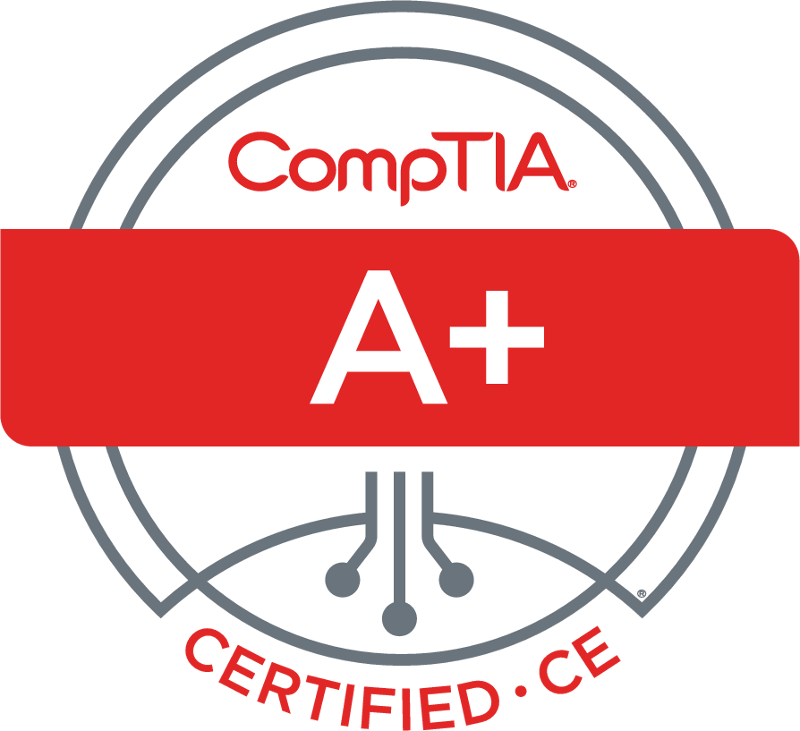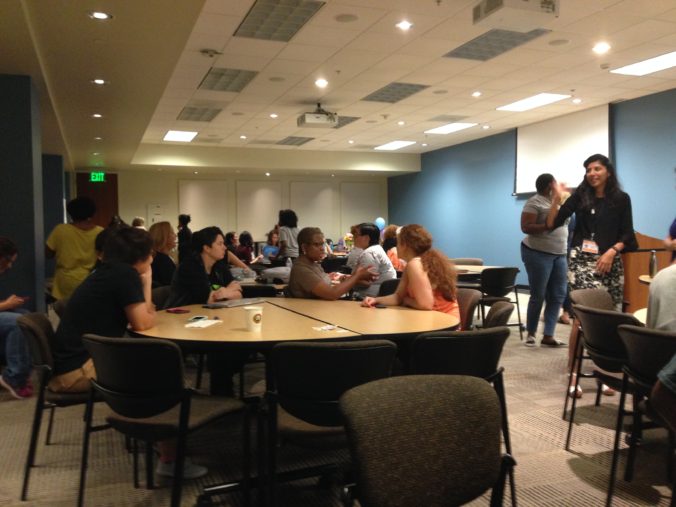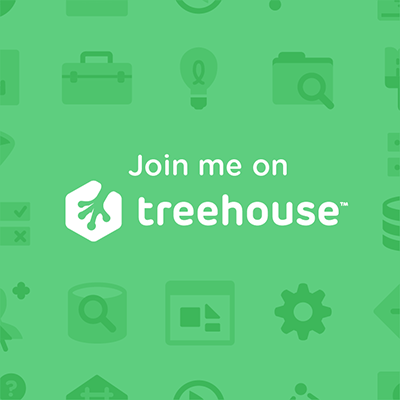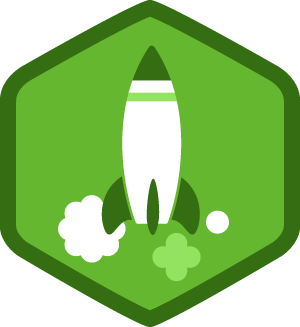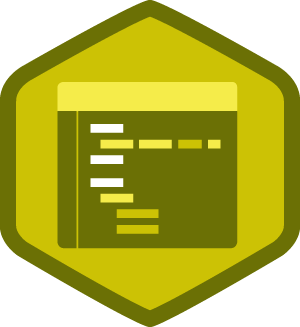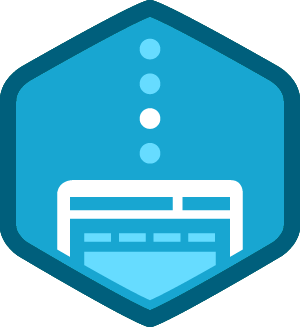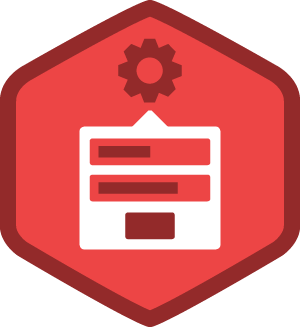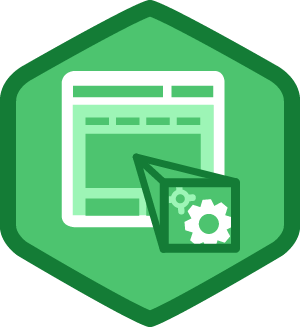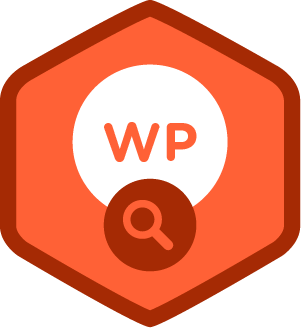The first We Rise Women in Tech conference, June 23 – 24th was organized by Women Who Code Atlanta. I’m in my mid-fifties, and after a mid-life career reboot (second degree), and starting some of the organizations I felt were essential to my – and others’ success in the Birmingham metro region – was only now getting out to my first tech conference. I was looking forward to more of the welcoming environment that I had found at the first Women Who Code hackathon in July 2016. I had to work Friday (the first day), so was only able to attend the Saturday sessions. My notes on the sessions I attended continue below the break.
Page 2 of 5
Because I was talking to a number of women at the We Rise Women in Tech conference this weekend, (June 24th) about the mechanisms necessary to make a given tech community penetrable by people who are not part of the dominant culture, (in Birmingham, white Caucasian hetero male), I want to park links to some of the organizations that I was introduced to who are developing the essential contact and education networks.
African American:
- Technologists of Color – currently centered in Atlanta. Yolanda Davis was at the conference.
- Institute for African-American Mentoring in Computer Sciences
- National Society for Blacks in Computing conference (just passed, was at the beginning of June)
- Blacks in Tech
Latino:
- LatinoTech
- TechLatino – Latinos in Information Sciences and Technology Association
5 LGBTQ organizations (article behind the link)
Steal this list! Build the community! My observations from WebGrrls in the late nineties, and now with Women Who Code, is that when you are a minority group within a given community, working to grow your presence in a regional industry, national and international organizations help. A lot.
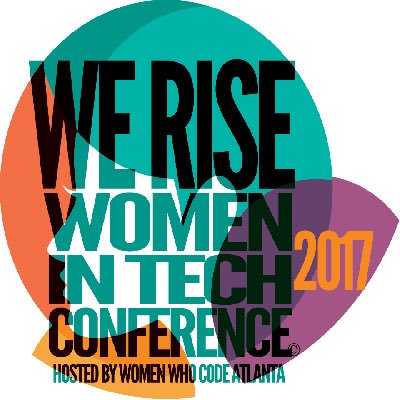 Just home from Women Who Code Atlanta’s We Rise Women in Tech conference. I have lots of notes to look through, suggestions for task-specific SDKs, contacts to follow up on, and new topics to explore. Reconnected with women I met last year at the first hackathon. I was only able to attend one day of this two-day conference due to work obligations but enjoyed every dang minute of it! So much positive energy, engagement, encouragement, reinforcement – it’s nice (and reassuring) to know that we’re out there, and we’re supporting one another. My notes from the sessions I attended follow.
Just home from Women Who Code Atlanta’s We Rise Women in Tech conference. I have lots of notes to look through, suggestions for task-specific SDKs, contacts to follow up on, and new topics to explore. Reconnected with women I met last year at the first hackathon. I was only able to attend one day of this two-day conference due to work obligations but enjoyed every dang minute of it! So much positive energy, engagement, encouragement, reinforcement – it’s nice (and reassuring) to know that we’re out there, and we’re supporting one another. My notes from the sessions I attended follow.
Hot tip – the 2nd Women Who Code hackathon date is set for October 15 – 17th. Save the date!
Update December 30th, 2018. We had a great series of boot camps over two years. As part of taking on that role, I wrote and passed both of the CompTIA A+ exams in 2017 and then the Network+ exam fall 2018. If you’re a young adult between the ages of 17 – 29, living in Alabama’s Jefferson County, who is unemployed or underemployed, I encourage you to check out current (paid for!) coding and data analytics boot camp options at Innovate Birmingham. Innovate Birmingham is working to ensure that valuable (and well-paid!) tech training is available for all.
I’m moving on to new projects, but am still deeply committed to mentoring those coming up in the regional industry behind me.
Why the CompTIA A+ exam?
The A+ is an entry-level tech industry certification that verifies that you meet a certain level of knowledge about computing hardware, operating systems, peripherals, and networking. It has two parts; the 220-901, which focuses on hardware, and the 220-902, which focuses on operating systems, networking, security and the command line(s).
If you have been working with Windows computers for while, have learned how to work at the command line, and have been working doing computing support, it will take you a week or so of study after work to prepare for each exam. If you’ve been using Windows (and a smart phone) but haven’t stepped into the back end or explored some of the finer points of the operating system, it will take you longer – but with persistence and focus, it’s completely doable.
Currently, in Alabama (especially in Birmingham), there are more jobs open where the certification is requested than there are people looking for work who hold it. Demand is expected to grow. Entry level positions are usually as a computer support specialist, with progression to system or network administrators, or to business analyst (usually other areas of education or knowledge) common. If you’re willing to put in the time and work (40 – 60 hours for someone with experience, up to 300 hours for someone new to tech), this certification opens doors. The CompTIA website has a career path roadmap PDF available for download. If you have other qualifications as well, it can be the start of a well-paid tech career.
Updated October 28, 2018.
In many cities with a tech scene there is a need for programmers and developers who aren’t necessarily computer science (CS) majors. CS is great for understanding the structures underlying programming, how software interacts with hardware, and the mathematics behind compression, encryption, algorithms graphics and topology. Their skills and understanding are needed to build computing and programming structures and frameworks, for working out effective storage techniques, telecommunication methods, encryption and for a lot of security work. You will always need these specialists. And, if you want to be a CEO of major tech company, the groundwork is vital.
But for the rest of us, a mix of our existing skillsets in combination with either a boot camp or self-study with tutorials are the most effective ways to start a programming career. Our power is crossover knowledge. We’re going to be working in teams to build and implement using existing tools – and being able to learn quickly, effectively and put existing pieces together to solve people’s problems is the best way we can contribute.
On Monday, September 12th, Women Who Code Birmingham held its Programming & Tech Career Development panel at UAB’s iLab at the Innovation Depot.
Twenty-seven women (and a few men) came out to learn what technical and software development employers are looking for in the Birmingham area, what to expect in a technical interview and how to ensure success starting a career after graduation from university, or when transitioning into the field from another career.
A few weeks back, I attended my first hackathon as an effective coder. I was helped in this, in part, by the hackathon organizational style used by Women Who Code.at their first hackathon in 2016. I liked it so much that I’m making notes as to what worked so that we can use it in Birmingham.
Attending
I attended my first hackathon a few weeks ago.* It was organized by the Atlanta, Tampa and Greenville networks of Women Who Code, a nonprofit focused on helping women advance their careers in the software and tech industries.
It was awesome. For the first time, I wasn’t terrified of not knowing something, of being found inadequate, or of not being able to contribute to a team. As a mid-life career changer, I’m still a relative noob when it comes to programming. The Women Who Code hackathon organizers did several things to help myself (and many others!) get past our fears and do good work at our first hackathon.
- They organized a pre-hackathon orientation session Friday afternoon, in which they ran through what to expect, team roles and how our final products and pitches would be scored. Knowing what to expect helped me settle in and focus on how I could help my team and not worry about hitting ill-defined performance targets.
- They had mentors (subject matter and programming language experts) available throughout the hackathon, to help teams get past knowledge sticking points.
- Food – we were NOT going to starve. There was lots of non-carb food, coffee, and caffeine, all necessary for sustained work.
- Finally, everyone presented. Didn’t matter how big or small the final application was – you talked about it.
 Atari Inc.: Business Is Fun by Curt Vendel
Atari Inc.: Business Is Fun by Curt Vendel
My rating: 3 of 5 stars
Summarizes the conditions under which Atari games were first developed – and launched an industry. Not as tightly edited as some books out there (was self-published), but has historical details not available elsewhere. If you want to understand the roots of today’s game industry, is an essential read.
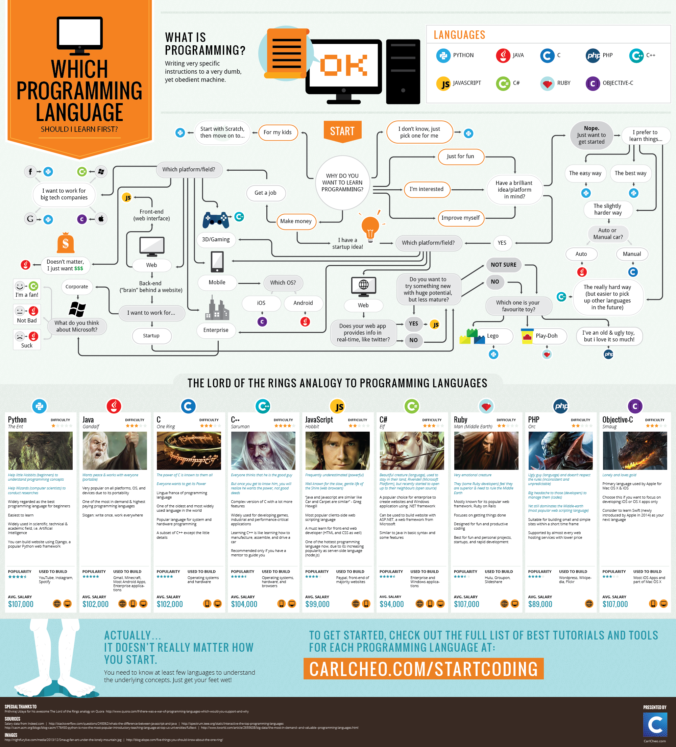
How to pick a first programming language infographic
Parking some links for a session I’m doing at the Women Who Code Birmingham network tonight.
One of the big questions I had when I first started programming was…. how to pick a first programming language. No student or prof would – or could – give me a straight answer as to what languages were the most useful for different applications.
Recently, I stumbled across Carl Cheo’s great flow chart on picking a first programming language based on what you need to do. I hope you find this useful and informative as I do – it’s something that I wish had been available when I first started dabbling in programming.
The other question newbies often ask is “what exactly do programmers do?” Carl Cheo has a second great infographic that answers that question.
